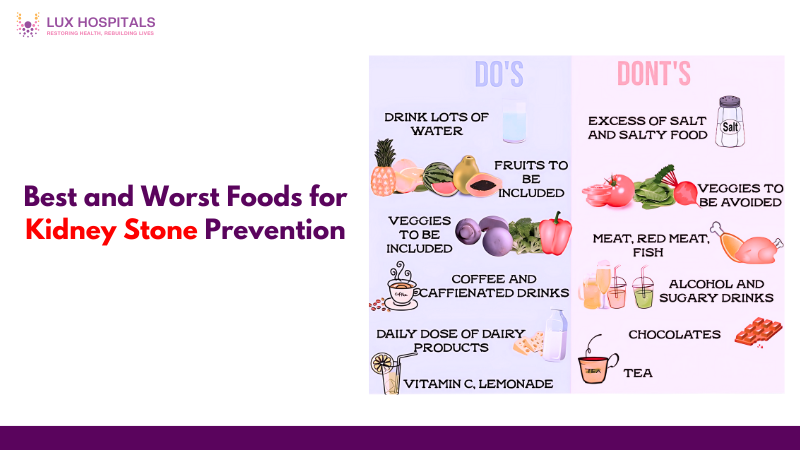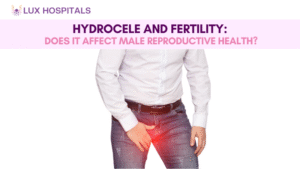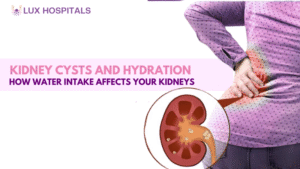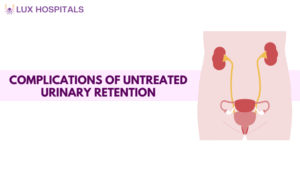Best and Worst Foods for Kidney Stone Prevention

Kidney stones are one of the most painful urological conditions. Anyone who’s experienced them knows how excruciating they can be. While genetics and medical conditions play a role, your daily diet has a major impact on whether or not you develop stones. The good news? With the right food choices, you can actively reduce your risk.
In this article, we’ll explore the best and worst foods for kidney stone prevention, helping you make wise choices for long-term kidney health.
Understanding Kidney Stones and Why Diet Matters
Hard mineral deposits known as kidney stones develop in the kidneys as a result of excessive concentrations of certain chemicals in the urine, including uric acid, calcium, and oxalate. The size of these stones varies, and they can cause significant pain, nausea, and even blood in the urine as they pass through the urinary tract.
Fortunately, adjusting your diet can go a long way toward kidney stone prevention. Many healthcare professionals recommend a targeted diet to prevent kidney stones as part of a broader lifestyle change.
Best Foods for Kidney Stone Prevention
Certain foods are better than others for preventing stones. The best meals for kidney stone prevention that promote urinary health are listed here.
1. Water and Hydrating Fluids
Staying well-hydrated is your first line of defense. Drinking enough water dilutes the substances that lead to stones. Drink 2.5 to 3 liters of water a day at the very least, or more if you live in a hot area or exercise regularly.
2. Citrus Fruits (Lemon, Orange, Lime)
Citrus fruits contain natural citric acid, which helps prevent stone formation by binding calcium in the urine. Start your day with lemon water or snack on an orange for an easy win.
3. Low-Oxalate Vegetables
Some vegetables are high in oxalate (a compound that contributes to stone formation), but many are safe and beneficial. Examples include cabbage, cauliflower, bell peppers, and cucumbers.
4. Calcium-rich foods (From Natural Sources)
It may sound counterintuitive, but calcium from food—not supplements—can help. In your stomach, calcium bonds with oxalate to stop it from entering your bloodstream. Select dairy products with less fat, such as cheese, yogurt, and milk.
5. Whole Grains and Fiber-Rich Foods
In order to prevent kidney stones, a healthy diet should include whole grains like barley, oats, and brown rice. Fiber aids in controlling how minerals are absorbed, which may assist cause stones to develop.
6. Magnesium- and Potassium-Rich Foods
Nutrients like magnesium and potassium help lower the risk of kidney stones. Bananas, avocados, sweet potatoes, and leafy greens are excellent choices.
Worst Foods for Kidney Stone Prevention
Some foods increase the likelihood of developing kidney stones. These should be limited or avoided, especially if you’re prone to stones or have had them before.
1. Oxalate-Rich Foods
Foods high in oxalates, the most common type can contribute to calcium oxalate stones. Avoid or limit spinach, beets, rhubarb, nuts, and chocolate. If you eat them, pair them with calcium-rich foods to reduce risk.
2. High Animal Protein Intake
Diets heavy in red meat, eggs, and seafood increase uric acid levels and can lower citrate (a compound that prevents stones). A couple times a week, think about reducing your intake of animal protein or replacing it with plant-based sources.
3. Salty and Processed Foods
Excess sodium causes more calcium to be excreted in your urine, increasing your risk of stones. Watch out for salty snacks, canned soups, processed meats, and fast foods.
4. Sugary Foods and Drinks
Foods high in sugar especially those with high-fructose corn syrup like sodas can boost stone-forming substances in your urine. Limit desserts, commercial fruit juices, and sugary cereals.
5. Caffeine and Alcohol (in Excess)
While moderate caffeine and alcohol are okay for some people, they can contribute to dehydration if overused. Dehydration is one of the most significant risk factors for kidney stones.
Tips for Kidney Stone Prevention
- Spread out calcium and oxalate intake throughout the day rather than consuming a large amount in one meal.
- Avoid excessive vitamin C supplements, as the body can convert vitamin C into oxalate.
- Choose plant-based meals when possible to reduce uric acid levels.
- Get regular checkups if you’ve had kidney stones in the past early detection can help prevent complications.
These small adjustments to your regular routine and food choices are a sustainable way to support kidney stone prevention over time.
When to Seek Medical Advice?
If you’re experiencing symptoms like severe back pain, blood in urine, or painful urination, consult a doctor immediately. While lifestyle and diet play key roles, you may still require kidney stone treatment especially for larger stones or recurring episodes.
In such cases, your doctor may recommend imaging tests, medications, or surgical options to break up or remove the stones. A personalized diet to prevent kidney stones can also be designed based on your type of stone.
Conclusion:
Choosing the right foods for kidney stone prevention can be the difference between comfort and a painful ER visit. Hydration, fresh produce, and balanced nutrition are your best tools. Just as important, staying away from salty, sugary, and oxalate-heavy foods helps safeguard your kidneys from future trouble.
Start making small, mindful changes to your plate today it could save you from major discomfort tomorrow.
Frequently Asked Questions
Mineral accumulation is the cause of kidney stones and salts—like calcium, oxalate, or uric acid—in the urine, often due to dehydration, poor diet, certain medical conditions, or genetic factors.
Calcium from food is generally protective against kidney stones. However, excessive calcium supplements (not food) may increase the risk. It’s best to get calcium through natural dietary sources unless advised otherwise by a doctor.
Try to consume 2.5 to 3 liters of water per day. Proper hydration dilutes urine and reduces the concentration of minerals that can form stones.
In some cases, yes. If you’ve had recurring stones or your doctor finds a high risk, they may prescribe medication alongside dietary changes for effective kidney stone treatment and prevention.
The kidneys may excrete more calcium if you consume a lot of sodium, increasing the risk of stones. To protect your kidney health, stick to a low-sodium diet.




















